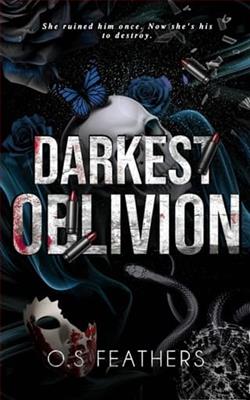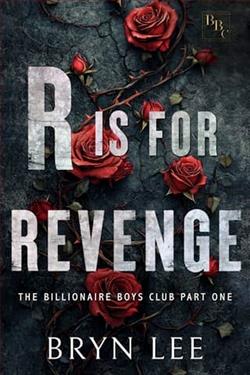Page 3 of Crimson Bound
Then he was gone.
She lasted for nearly three days.
On the first day, she hid the mark under a scarf and tried to be brave.
On the second day, she crept into the village church, clutching her rosary, and begged the Dayspring for a miracle.
On the third day, she gave up and ran for Aunt Léonie’s house. The mark hurt so badly she could barely breathe. She didn’t care anymore how ashamed she was; she just wanted Aunt Léonie to comfort her. Surely she could help. Aunt Léonie had always been able to make everything all right.
Around her, the woods awoke. Shadows became deeper shadows, and eyes glimmered from their depths. Ghostly fawns leaped over tree roots and disappeared. The Great Forest was coming into being all around her, and soon she would be lost. Then she made the last turn, and she finally saw Aunt Léonie’s house. She sobbed in relief as she staggered to the door.
But she was too late.
The forestborn had gotten there first.
ONCE UPON A TIME, THERE LIVED A PRINCE AND a princess named Tyr and Zisa.
You have heard this. After a fashion, it is true. The people who lived before the sun and moon built no cities, crowned no kings, fought no wars. They stole from one darkened hollow to the next, listening to the wind, dreading the day when the lords of the forest would visit them.
When the forestborn did visit their mewling human flocks, sometimes they would choose favorites. Tyr and Zisa’s father was one of these: he had danced to the forestborn’s music and offered them his kin. In return, they had made him ruler of the tribe that huddled beside an icy black lake.
What it gained Tyr and Zisa was this: they knelt beside him when the forestborn came to visit. Every member of the tribe but their father watched them with silent fear. And when they were sixteen years old, they painted their faces with ocher and blood, and sat obediently as the forestborn came to decide which of them would become a forestborn, and which would be sacrificed as a vessel for the Devourer.
The forestborn stood in a ring about the twins and laid a sword between them. Whichever one first cut off the hand of the other would become the forestborn. Whichever was weak enough to be maimed would become the sacrifice. If neither fought, they both would die that instant.
Zisa would have gladly lost hands and feet and eyes and tongue for her brother. But she knew that if she waited for him to pick up the sword, he would refuse and die beside her, and his death was the one thing she could not endure.
So she picked up the sword and cut off his right hand.
1
Wind gusted down the twisting nighttime streets of Rocamadour, whipping up the soft rain into a lash. Crouched atop the house’s gable, Rachelle slitted her eyes against the sting and looked across the rooftops. There was no moonlight, but to Rachelle, the air gleamed with hidden currents, whorls and eddies of power unseen by normal human eyes. She could not only see the great hulk of the cathedral far off to her left, but also distinguish the silhouette of every gargoyle clinging to its spires. Three streets over, a carriage rattled homeward, and she could spot the individual spatters where the horse’s hooves struck mud.
And all around her, she could see the shadow of the Great Forest.
Something happened when cities grew large enough. When the labyrinths of their grimy cobblestone streets became as twisted as the interwoven branches of the forest canopy, the power of the Great Forest began to seep through. Ordinary humans might only have a vague feeling that there was something uncanny about the darkened streets. But Rachelle was bloodbound. Within the shadows of the buildings, she could see darker shadows cast by phantom leaves and branches. Within the whistle of the wind, she could hear the ghostly forest whispers.
It was time to hunt.
Rachelle took off running along the ridgepole. Ahead of her, the roof came to an end, and she leaped. For one moment she sliced, weightless, through the air and darkness; then her feet hit the next roof and skidded. In a heartbeat she had her balance back and was running again.
East of the cathedral, there was a neighborhood that had suffered five woodspawn attacks in the last two weeks. That wasn’t just a series of random incursions; that was a pack, returning again and again to the place where they had found prey.
They were not going to hunt anyone else tonight.
Another roof, and another. Then Rachelle reached the wide, paved expanse of the Place du Gloire. She ran straight across, dropping from the rooftops to the ground.
At the center of the square stood two bronze statues of Tyr and Zisa holding the swords Joyeuse and Durendal. The bases of the statues were papered over with broadsheets—more dissidents asking how the King could dare to raise taxes when crops were failing because of the shortening days. To resist naming an heir when rumor said his health was ailing. To let the bloodbound live when everybody knew the Forest was growing stronger.
She’d been seeing a lot of broadsheets lately. Soon there would be another set of fools trying to attack the King’s bloodbound. And another round of arrests.
Rachelle swarmed straight up the face of the building on the other side of the square, and put both King and rebels out of her head. Everything was simpler on the roofs. She ran and leaped, nothing to push her back but the wind itself, until she reached the neighborhood where the woodspawn kept attacking. Then she settled herself on a ridgepole to watch and wait.
And wait.
The night slowly wore on. The fire that had burned in her veins as she raced across the city was gone. Now she was cold and stiff; her eyes throbbed from lack of sleep and her fingers, still clutching the hilt of her sword, were almost completely numb. But she had promised herself she wouldn’t sleep until she took care of this pack.
To keep herself awake, she stared at the glowing red string that was tied to her finger and trailed away off the roof. The string—invisible to everyone but her—was a reminder of why she couldn’t stop hunting. If she looked at it long enough, she knew the scar on her right palm would start aching. That, too, was a reminder.
She would never deserve to stop hunting.
As if in answer to the thought, she heard a chorus of soft, almost musical moans.
Then she saw them on the street below: five doglike woodspawn, whippet-thin, their white bodies translucent, their muzzles bloodred. They looked like the ghosts of a court lady’s lapdogs, but Rachelle had seen them tear a man to pieces in minutes.
One of the hounds slowed, lagging behind the others, and tilted its head up to sniff the air.
Rachelle drew her sword and flung herself down.
The hound had dodged before her feet hit the mud. But it didn’t move fast enough to escape her sword. The blade cut through translucent flesh and bone; blood spurted, suddenly vivid and corporeal, but by the time the body hit the ground, it was already turning to mud.















